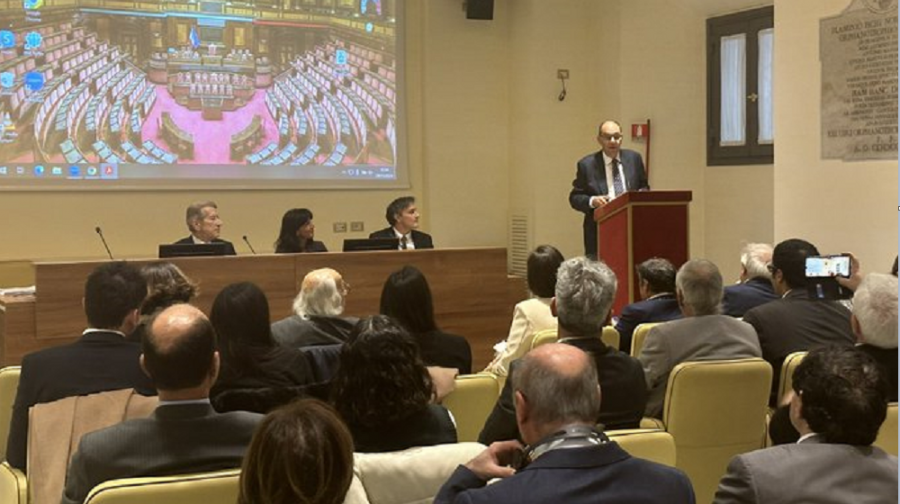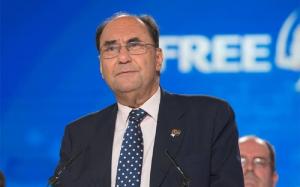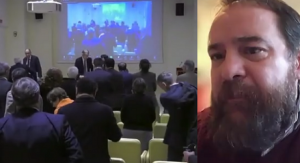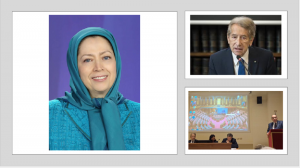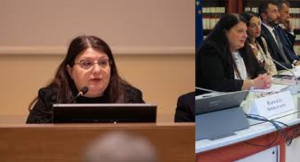
(Video) Italian Senate Hosts Conference Calling for Stronger European Policy on Iran
Senator Pellegrino concluded," her support for Maryam Rajavi’s Ten-Point Plan, stating: “It represents a clear vision for a free and democratic Iran.”
PARIS, FRANCE, December 9, 2024 /EINPresswire.com/ -- The National Council of Resistance of Iran (NCRI) Foreign Affairs Committee in an article published that on November 29, 2024, a conference at the Italian Senate brought together prominent political figures and foreign policy experts to discuss Europe’s policy failures on Iran and to advocate for a firmer stance against Tehran’s authoritarian regime.
Key speakers included Senator Giulio Terzi, former Italian Foreign Minister; Alejo Vidal-Quadras, President of In Search of Justice (ISJ) and former Vice President of the EU Parliament; Farzin Hashemi, Deputy Chair of the NCRI’s Foreign Affairs Committee; Matteo Angioli, Secretary General of the Global Committee for the Rule of Law; Anna Cinzia Bonfrisco, former Member of the Foreign Affairs Committees at the EU Parliament; and former Italian Senator Roberto Rampi.
The event highlighted Iran’s escalating human rights abuses and its continued use of state-sponsored terrorism. The discussions underscored the regime’s tactics of intimidation and urged the European Union to adopt a cohesive and uncompromising policy toward Iran, ensuring the safety of its citizens while supporting the Iranian people’s aspirations for freedom and democracy.
Matteo Angioli opened the conference by welcoming participants and emphasizing the importance of the event in addressing Europe’s failed policy toward Iran. Angioli praised the leadership of Dr. Alejo Vidal-Quadras and Senator Giulio Terzi, the organizer of the initiative, for their tireless efforts to highlight the Iranian regime’s human rights abuses and support for terrorism.
Angioli remarked, “It is an honor and a privilege to host Alejo Vidal-Quadras, a champion of justice and democracy, and Senator Terzi, whose leadership as President of the Permanent Commission for EU Affairs of the Italian Senate has been pivotal in this cause.”
He acknowledged the participation of key figures in the fight for a democratic Iran, including Cinzia Bonfrisco, Roberto Rampi, and others who have been steadfast supporters of the Iranian Resistance.
Setting the stage for the discussions, Angioli underlined the critical role of such conferences in galvanizing international action, adding: “This is not merely a presentation of a report but a vital step toward shedding light on the atrocities of the Iranian regime and supporting Senator Giulio Terzi highlighted the Iranian regime’s reliance on terrorism as a cornerstone of its foreign policy, stating, “Iran uses its diplomatic apparatus not for diplomacy but as a cover for terrorism.
This is exemplified by the case of Assadollah Assadi, an Iranian diplomat who orchestrated a bombing attempt on an opposition rally in Paris, targeting dignitaries and parliamentarians.
Arrested and sentenced in Belgium, his release in a prisoner swap only underscores Tehran’s use of terror and extortion.”
He praised Alejo Vidal-Quadras and the ISJ’s White Paper, describing it as a critical tool for exposing Iran’s systematic abuses.
Terzi added, “The regime acts as a terror state, using its Revolutionary Guards to execute dissenters, torture political prisoners, and spread instability across the region through proxies financed by oil smuggling and criminal networks.”
The former Italian FM underscored the brutality of the regime’s repression, remarking, “The IRGC and its judiciary systematically hang and torture their own people, operating under a state apparatus that many rightly define as terrorist.”
He stressed the need for a decisive European response, asserting, “The appeasement policy pursued since the 1979 revolution has failed. Europe must recognize Iran for what it is: a regime driven by brutality and terror, unfit for negotiation or reform.”
Concluding, Senator Terzi lauded the Iranian Resistance, led by Maryam Rajavi, for presenting a democratic alternative. He stated, “Their Ten-Point Plan, emphasizing equality, democracy, and denuclearization, shows the way forward for a free and peaceful Iran.”
the democratic aspirations of the Iranian people.”
Dr. Alejo Vidal-Quadras delivered a compelling critique of Europe’s policy toward Iran, calling for a complete overhaul of its approach. He characterized the Iranian regime as a “criminal and totalitarian theocracy” that spreads terror globally and brutally suppresses its own people.
Highlighting his own survival from an assassination attempt by an Iranian-backed hitman, Vidal-Quadras detailed how the regime uses violence to silence dissent and targets both Iranian dissidents and their supporters abroad.
He condemned Europe’s appeasement policies, including negotiations and economic agreements, stating: “Negotiation and dialogue with the Iranian regime not only do not work but are counterproductive.”
Dr. Vidal-Quadras emphasized the urgent need for international support for the National Council of Resistance of Iran (NCRI) and its backbone, the People’s Mojahedin Organization of Iran (PMOI/MEK), as the credible alternative to the regime.
He praised their resilience, saying: “Their unfailing commitment, endurance, and patriotism make them the only organization capable of leading a peaceful transition to democracy.”
Outlining his proposed policy changes, Dr. Vidal-Quadras urged:
1. The closure of Iranian embassies in Europe and the expulsion of Iranian diplomats.
2. The designation of the Islamic Revolutionary Guard Corps (IRGC) as a terrorist organization.
3 .Financial sanctions to weaken the regime’s resources.
4. International accountability for human rights violations, including crimes against humanity.
5. Full political and diplomatic recognition of the NCRI.
He concluded with a call to action, asserting: “What is at the end materially effective is what is morally right… Let us stand by the people of Iran in their struggle to achieve freedom and democracy.”
Senator Cinzia Pellegrino shared a powerful written statement condemning the rising number of executions in Iran and voicing strong support for the Iranian Resistance and its fight for democracy.
Senator Pellegrino highlighted the dramatic increase in executions over the past year, emphasizing: “Capital punishment is an abhorrent practice that massively targets opponents of the mullahs’ regime, who risk death sentences merely for participating in protests.”
Citing data from Iran Human Rights Monitor, she noted that in September 2024 alone, 73 executions were recorded, a threefold increase compared to September 2023. She added that “real figures are significantly higher, as most executions in Iran occur without media coverage and in total silence.”
The Italian senator described August 2024 as “the darkest month this year,” with 110 executions, the highest monthly tally, bringing the total for 2024 to over 800, according to human rights activists. She called this “a ruthless trend in executions,” sparking deep concern among human rights advocates worldwide.
In her statement, she commended the Iranian Resistance for its unwavering stand against the death penalty and the regime’s misinformation campaigns, asserting: “This is a battle we must persistently fight not only against the death penalty but for the rights and democracy of all Iranian citizens.”
Senator Pellegrino concluded by reaffirming her support for Maryam Rajavi’s Ten-Point Plan, stating: “It represents a clear vision for a free and democratic Iran.”
Anna Cinzia Bonfrisco delivered a powerful speech condemning the European Union’s failures in confronting the Iranian regime. She highlighted years of “complicit silence” and appeasement policies, citing the EU’s inaction even in response to the regime’s appointment to international bodies like the UN Commission on the Status of Women. She remarked, “It was only through efforts led by Alejo Vidal-Quadras and others that Iran was removed from this position of disgrace.”
Bonfrisco criticized European leaders for prioritizing economic ties with Iran over human rights, recalling past efforts to block Italian financial guarantees for projects in Iran that would have indirectly funded terrorism.
She stated, “We exposed the fact that Iranian banks financing these projects were known sponsors of terrorism. To proceed would have made us complicit in supporting the regime’s proxies.”
She praised the Iranian Resistance, including the MEK, for their courage and commitment, adding: “Thanks to the brave men and women of the Iranian Resistance, we know the truth about this bloodthirsty regime. Knowing obligates us to fight it.”
The former MEP emphasized the need to restore moral authority to international institutions, concluding: “If Europe continues on its path of hypocrisy and inaction, we will fail the Iranian people and undermine global trust in the international order. The time for clarity and action is now.”
She expressed unwavering support for the Resistance, promising continued efforts to combat the Iranian regime: “We must stand together against this murderous regime and ensure that justice prevails.”
Roberto Rampi strongly appealed for international attention on the Iranian regime, emphasizing the critical role of regime change in securing lasting peace in the Middle East. He highlighted the importance of the Iranian Resistance, particularly the MEK, in offering a democratic alternative for Iran’s future.
Rampi underscored the destructive influence of the Iranian regime, stating, “Iran destabilizes the entire Middle East, openly funding and arming proxies like Hamas and other militias, which act as extensions of the regime’s military power.” He argued that international attention on Iran has waned despite its central role in regional instability.
He lauded the Iranian Resistance’s democratic organization and commitment to a peaceful transition, calling its Ten-Point Plan a viable roadmap for a free Iran. Rampi stated, “This extraordinary nation, with its millennia-old culture, deserves to be liberated from the grip of a regime that exports chaos and terror.”
Rampi called on European and Italian leadership to adopt a firm stance against Tehran, urging action: “Italy must reclaim its historical role in shaping Middle East peace, leading the charge against the Iranian regime.” He concluded with optimism: “I firmly believe that one day we will discuss the future of the region, not in exile, but in a free and democratic Tehran.”
Farzin Hashemi delivered a detailed address outlining the Iranian regime’s vulnerabilities and emphasizing the solution offered by the Iranian Resistance.
He criticized the policy of appeasement, stating, “Had it not been for appeasement by the European Union, the mullahs’ regime would not have dared to engage in heinous acts like the attempted assassination of Dr. Alejo Vidal-Quadras.”
Hashemi identified six key developments revealing the regime’s fragility, including the continued demands for regime change following the 2022 uprising, public boycotts of sham elections in 2024, the strategic blow from Ebrahim Raisi’s death, and international setbacks, such as Hezbollah’s weakened position.
He also highlighted the growing recognition of Maryam Rajavi’s Ten-Point Plan and the rise of Resistance Units within Iran, which he described as “a well-organized force breaking the wall of repression.”
Rejecting the regime’s narrative that the choice is limited to appeasement or war, Hashemi emphasized, “There is an Iranian solution overthrowing the regime by the people and the organized resistance, followed by a smooth transfer of power through a provisional government and free elections.”
Hashemi underscored the NCRI’s democratic vision, noting its principles of “religious freedom, ethnic autonomy, peace, coexistence, and a non-nuclear Iran,” as well as its strong leadership of women. He called for immediate international action, urging governments to recognize the NCRI as the viable alternative and to “blacklist the IRGC for its role in both internal suppression and international terrorism.”
He concluded with a clear call to action: “The time has come for a new policy centered on the Iranian people and their organized resistance, not the criminal mullahs.”
If you wish to receive the NCRI weekly Newsletter, please use the following link to subscribe: https://bit.ly/3SMgEla.
Shahin Gobadi
NCRI
+33 6 61 65 32 31
email us here
Farzin Hashemi delivered a detailed address outlining the Iranian regime’s vulnerabilities and emphasizing the solution offered by the Iranian Resistance.
Distribution channels: Human Rights, International Organizations, Politics, U.S. Politics, World & Regional
Legal Disclaimer:
EIN Presswire provides this news content "as is" without warranty of any kind. We do not accept any responsibility or liability for the accuracy, content, images, videos, licenses, completeness, legality, or reliability of the information contained in this article. If you have any complaints or copyright issues related to this article, kindly contact the author above.
Submit your press release
